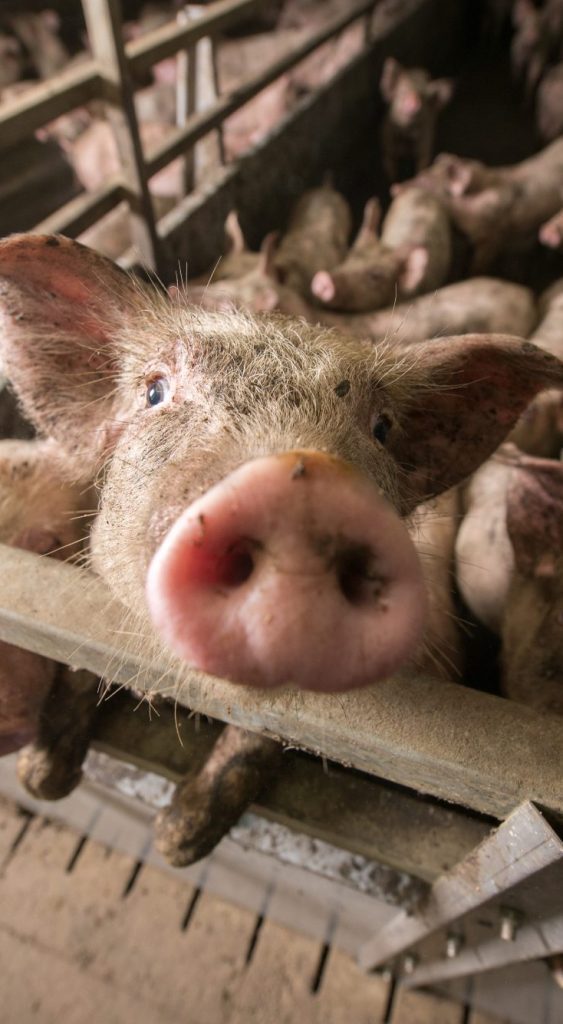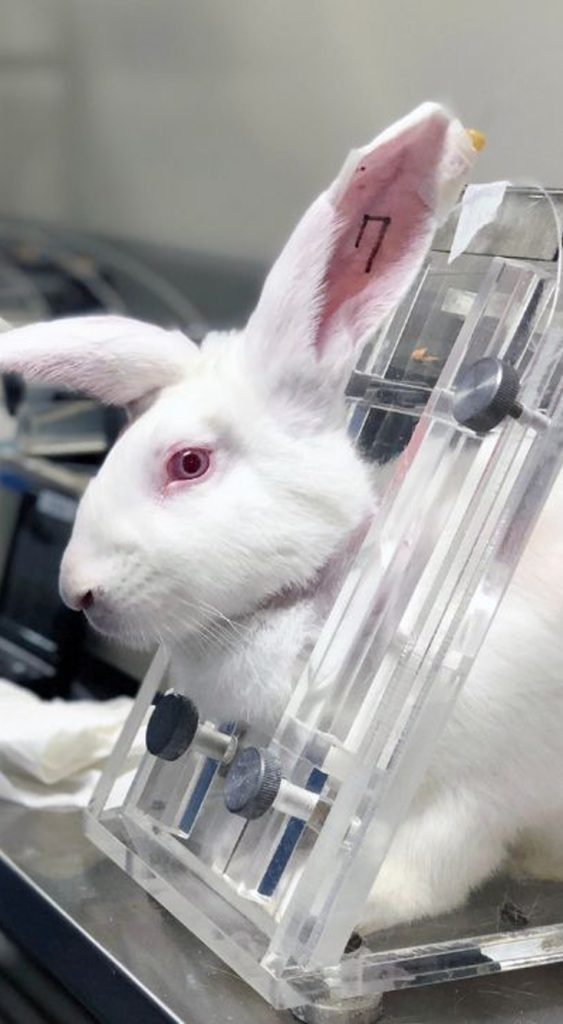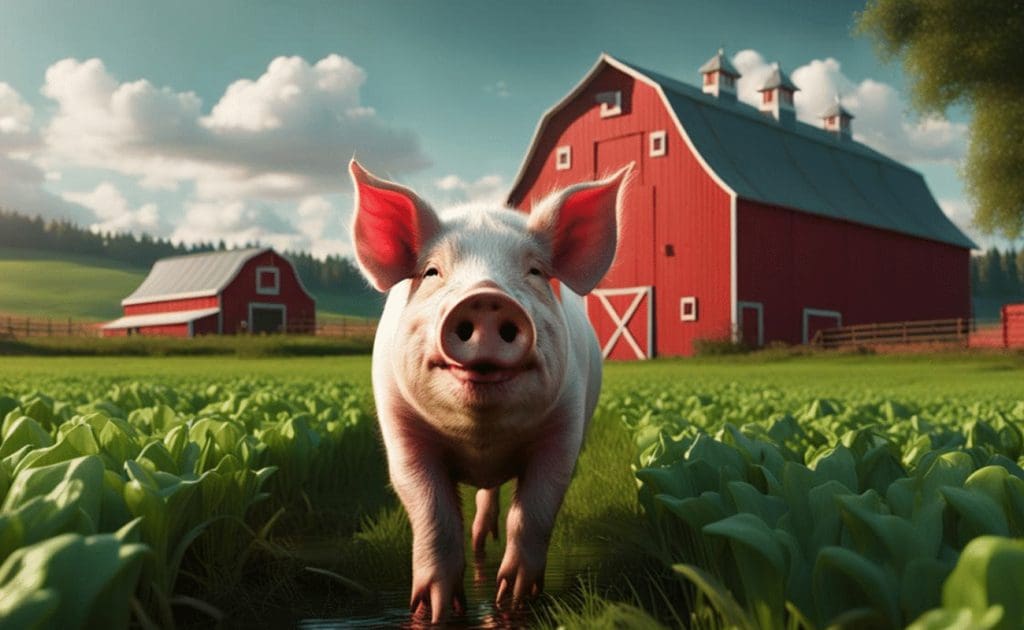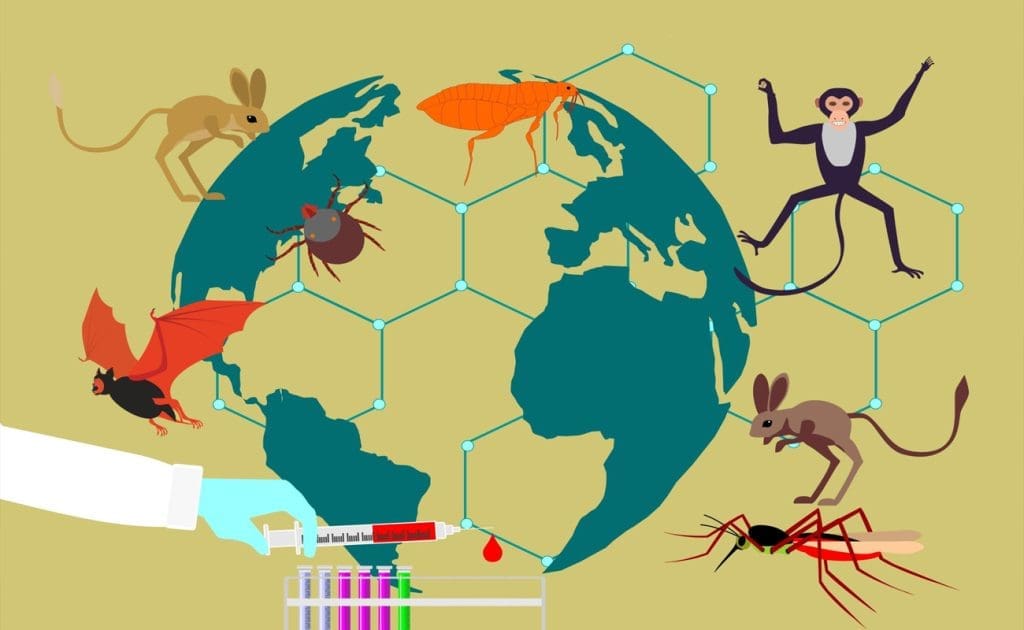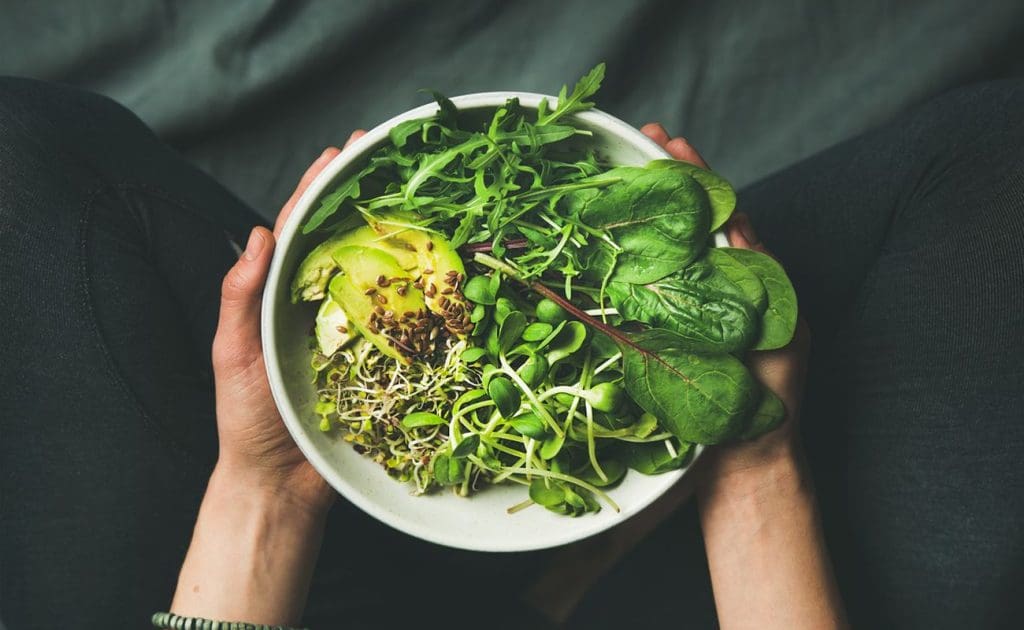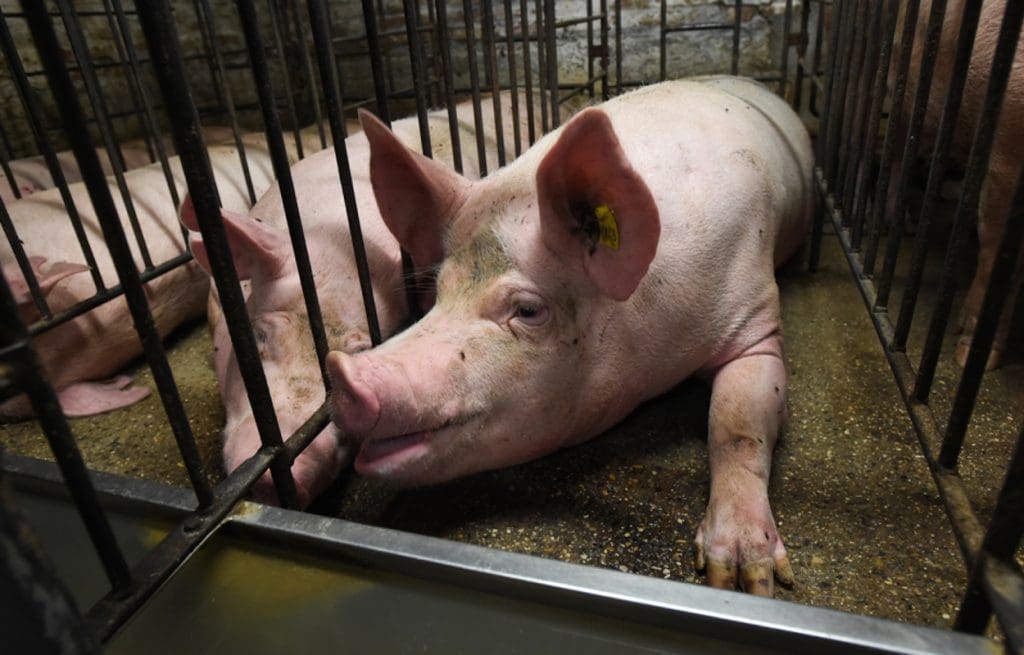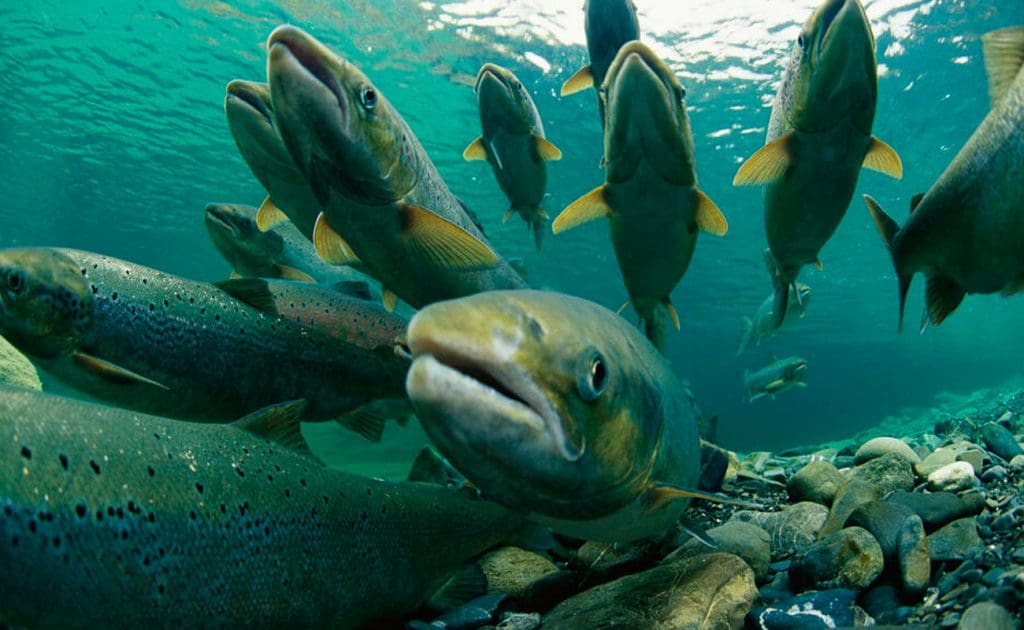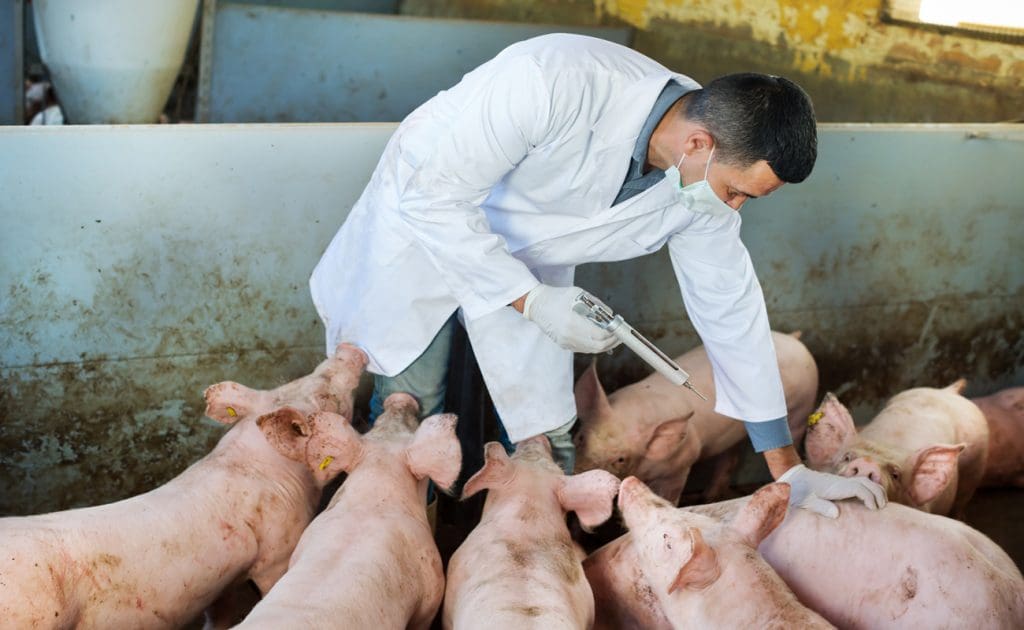
1 i le 2.8 tiliona
o le vai e mana'omia e fa'atupu ai le kotograma e tasi o povi — o se fa'ata'ita'iga manino o le auala e fa'aaogaina ai e le fa'ato'aga manu le tasi tolu o le vai fou a le lalolagi. [1]

80%
o le fa'aleagaina o le vaomatua o Amazon e mafua ona o le fa'ato'aga o povi — o le tagata sili ona sala i tua o le fa'aleagaina o le vaomatua tele o le lalolagi. [2]

77%
o fanua fa'ato'aga i le lalolagi atoa o lo'o fa'aaogaina mo manu ma fafaga - peita'i e na'o le 18% o kalori a le lalolagi ma le 37% o lona polotini. [3]

Vapor Gas
O fa'ato'aga manu e maua mai ai le tele o kasa e fa'aleagaina le si'omaga nai lo le vaega atoa o felauaiga i le lalolagi. [4]

92 pasene
o manu faʻatau i le lalolagi e fasiotia mo meaʻai i tausaga taʻitasi - ma 99% o latou e faʻaumatia le olaga i faʻatoʻaga fale gaosi oloa. [5]

400+ itua
o kasa oona ma le 300+ miliona tone o otaota e gaosia e faʻatoʻaga fale gaosi oloa, faʻaleagaina o tatou ea ma vai. [6]

Fa'ato'aga Fa'ato'aga: Sauaga mo Tagata, Manu ma le Paneta 78
o saito e fafaga fed to manu i le tausaga uma — lava e fa'afilemu ai le fia'ai i le lalolagi i le tele taimi. [7]

37%
o le methane emissions e sau mai le fa'ato'aga o manu — o se kasa e 80 taimi sili atu le malosi o le CO₂, e fa'ateleina ai le malepe o le tau. [8]

80%
o vaila'au fa'ama'i i le lalolagi atoa o lo'o fa'aaogaina i manu fa'ato'aga, e fa'atuputeleina ai le tete'e atu i vaila'au fa'ama'i. [9]

Fa'ato'aga Fa'ato'aga: Sauaga mo Tagata, Manu ma le Paneta 83
Saua. Leai se mafua'aga. Leai se mea e masani ai. [10]

60%
spoiler [11]

75%
o fanua faʻatoʻaga i le lalolagi atoa e mafai ona faʻasaʻolotoina pe a faʻaaogaina e le lalolagi taumafa faʻavae i laʻau - tatala se eria e tutusa ma le Iunited States, Saina, ma le Iuni a Europa faʻatasi. [12]

Fa'ato'aga Fa'ato'aga: Sauaga mo Tagata, Manu ma le Lalolagi 84
O le mea sili lea e mafai ona tatou faia e sui ai le auala tatou te 'ai ai. O taumafa e fa'avae i la'au o se filifiliga feso'otai mo le tatou lalolagi ma ituaiga eseese tatou te fa'atasi ai.

Fa'asao le Lalolagi
O le fa'ato'aga o manu o le mafua'aga autu o le leiloa o le 'ese'ese o meaola ma le fa'ama'i o ituaiga i le lalolagi atoa, e fa'atusaina ai se lamatiaga tuga i o tatou si'omaga.
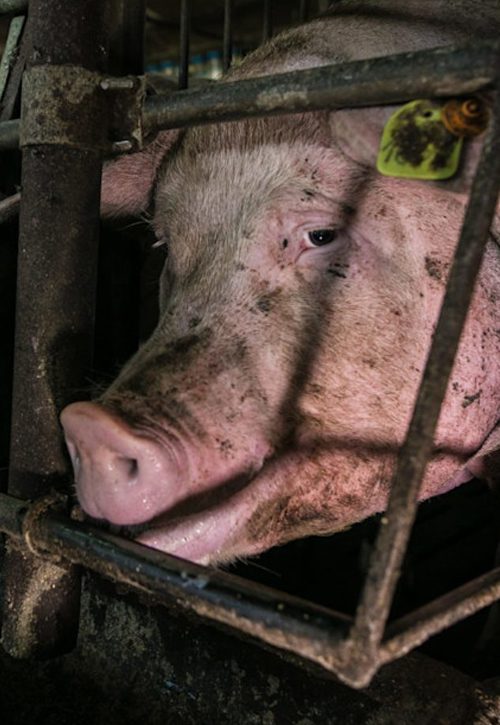
Faʻauma le mafatia
O faʻatoʻaga fale gaosi oloa e faʻalagolago tele i le manaʻoga a le tagata faʻatau mo aano o manu ma oloa e maua mai i manu. O taumafa uma e faʻavae i laʻau e fesoasoani i le faʻasaʻolotoina o manu mai faiga sauā ma faʻaogaina.

Manuia i La'au
O mea'ai fa'avae i la'au e le gata e suamalie ae mauoa foi i vaitamini taua ma minerale e fa'aleleia ai le malosi ma fa'aleleia le soifua maloloina atoa. O le fa'aaogaina o se taumafa e tele la'au o se fuafuaga lelei mo le puipuia o fa'ama'i tumau ma le lagolagoina o le soifua maloloina mo se taimi umi.
O le sauā o fa'ato'aga:
O manu e mafatia i le filemu, Matou te avea ma o latou leo.
1,048M Tone
So'o se mea e afaina ai manu po'o latou leo e le fa'alogoina, matou te la'iti i le fa'afesaga'i atu i le saua ma le lagolagoina o le alofa. Matou te galulue ma le fa'amaoni e fa'aalia ai le fa'asa'o, fa'atino suiga tumau, ma puipuia manu po'o latou manuia e fa'afefe.
O le Fa'afitauli
O le Upumoni i Tua o A Tatou Alamanuia Taumafa
O le mea moni i tua o a tatou alamanuia mea'ai o lo'o fa'aalia mai ai se mea moni natia o le sauā o fa'ato'aga, lea e onosa'i ai e faitau piliona o manu le mafatia tele i tausaga ta'itasi. E sili atu i le a'afiaga i le manuia o manu, o fa'ato'aga fa'apisinisi e fa'aleagaina ai foi le si'omaga, mai suiga o le tau i le leiloa o le eseesega o meaola. I le taimi lava e tasi, o le faiga e fesoasoani i le fa'atupulaia o lamatiaga o le soifua maloloina, e aofia ai le puta, ma'i suka, ma fa'ama'i fatu. O le filifilia o se mea'ai fa'avae la'au ma le taliaina o le ola gafataulimaina o aga masani e ofo mai ai se fofo malosi — fa'aitiitia le mafatia o manu, puipuia le lalolagi, ma fa'aleleia le soifua maloloina o tagata.
LE ALAMANUIA O AANO O MANU
MANU FA'AMATE MO A'ANO
O manu e fasiotia mo a latou aano e amata ona mafatia i le aso latou te fanau mai ai. O le alamanuia aano o manu e fesoʻotaʻi i nisi o togafitiga sili ona ogaoga ma leaga.

Fa'ato'aga Fa'ato'aga: Sauaga mo Tagata, Manu ma le Paneta 69
Fanau mai i le mafatia, o povi e onosa'i le fefe, tu'ufua, ma faiga sauā e pei o le ave'ese o nifo ma le fa'ama'i — a'o le'i amata le fasiotia.

Pua'a
Pua'a, sili atu le atamai nai lo maile, latou te fa'aaluina o latou olaga i fa'ato'aga vaapiapi, e leai ni fa'amalama. O pua'a fafine e sili ona mafatia - toe fa'afafineina ma fa'apu'upute'aina i totonu o pusa la'itiiti ina ia le mafai ona liliu atu e fa'amafanafana ai a latou tama.

Mo'a
O moa e mafatia i mea sili ona leaga i fa'ato'aga fale ga'o. O lo'o fa'aputuina i fale leaga e faitau afe, ua fafaga e ola vave tele e le mafai ona taofiofia—e oo atu ai i tiga ma le oti vave. O le tele e fasiotia i le ono vaiaso le matutua.

Maneuli
O tama'i mamoe e mafatia ai i fa'asaunoaga tiga ma e vavae ese mai o latou tina i ni nai aso talu ona fanau—mo le 'atinae o aano. O latou mafatiaga e amata vave tele ma e fa'amuta vave tele.

Rabbits
O lapiti e mafatia ai i fasioti saua e leai se puipuiga fa'aletulafono—o le to'atele e taofi, fa'asaunoa, ma fa'ase'e le latou fa'a'i a'o latou ola pea. O latou tiga mutimutia e masani ona le va'aia.

Tui
I tausaga taʻitasi, e miliona o pipi e feagai ma oti sauā, e toʻatele e oti i le atuatuvale i le taimi o felauaiga poʻo le faʻafefe foi i totonu o fale fasi manu. E ui lava i lo latou atamai ma sootaga malolosi aiga, latou te mafatia filemu ma i numera tetele.
I TUA O LE SAUĀ
O le alamanuia o aano e fa'aleagaina ai le lalolagi ma lo tatou soifua maloloina.
Aafiaga o le Siosiomaga o Aano
O matou te faia
Lamatiaga i le Soifua Maloloina
O le 'aiina o mea'ai a manu e fa'atupula'ia ai le lamatiaga o fa'afitauli tuga o le soifua maloloina. O le WHO fa'avasegaina o aano o manufactured e pei o se carcinogen, fa'atupula'ia le lamatiaga o kanesa o le kolone ma le rectal e 18%. O mea'ai a manu e maualuga i ga'o tumu e feso'otai i ma'i fatu, taofi, ma'i suka, ma kanesa—o mafua'aga autu o le oti i le Iunaite Setete. O su'esu'ega o lo'o fa'aalia ai e ola umi atu le au vegetarians; o se tasi su'esu'ega na maua ai e 12% fa'aitiitia le ono oti i le ono tausaga fa'atusatusa i tagata 'ai manu.
LE ALAMANUIA SUUSU
SUSU'U O LE PŌLĀ
I tua o ipu uma o susu o lo'o i ai se ta'ava o mafatiaga - o tina o povi e toe fa'afafineina, na'o le ave'esea o a latou tama ina ia mafai ona aoina mai susu mo tagata.
Aiga ua malepelepe
I fa'ato'aga susu, e tagi tina mo a latou tama'i povi a'o ave'ese — ina ia mafai ona fa'aputu le susu mo i latou e fa'atau mo i tatou.
Fa'ato'aga Fa'ato'aga: Sauaga mo Tagata,afu, Manu ma le Lalolagi 87
O tama'i povi, na vavae'esea mai o latou tina, latou te fa'aaluina o latou olaga muamua i le tu'ua'aina malulu. O o latou tina e tumau pea i totonu o fale vaapiapi, e mafatia i tausaga o mafatiaga filemu - na'o le fa'atupuina o susu e le'i fuafuaina mo i tatou.
Fa'asaunoa tiga
Mai le tiga o le faʻailoga i le tiga o le faʻaumatia o nifo ma le faʻapipiʻiina o siʻotail - o nei faʻataʻitaʻiga sauā e faia e aunoa ma se faʻamaʻi, ma tuʻu ai povi ua maʻafaina, fefefe, ma malepelepe.
Fa'asaunoa oti
O povi ua fananau mo le susu o lo'o feagai ma se fa'ai'uga sauā, ua fasiotia i le talavou tele pe a le toe maua mai le susu. O le to'atele e onosa'i ni malaga tiga ma tumau pea le iloa i le taimi o le fasiotia, o latou mafatia ua natia i tua o puipui o alamanuia.
I TUA O LE SAUĀ
O le susu sauā e fa'aleagaina ai le si'omaga ma lo tatou soifua maloloina.
Le Tau o le Susu i le Siosiomaga
O le faʻatoʻaga susu e faʻasaʻolotoina ai le tele o methane, nitrous oxide, ma le carbon dioxide—potent greenhouse gases e faʻaleagaina ai le ea. E faʻamalosia ai foi le faʻaleagaina o le eleele e ala i le liliu ese o nofoaga masani i fanua faʻatoʻaga ma faʻaleagaina ai vai i le lotoifale e ala i le le saʻo o le faʻaogaina o le manure ma le faʻaogaina o fetilisi.
Lamatiaga i le Soifua Maloloina
O le taumafaina o oloa susu e feso'otai i tulaga lamatia maualuga o fa'afitauli ogaoga o le soifua maloloina, e aofia ai kanesa o le susu ma le prostate, ona o le maualuga o le insulin-like tuputupu ae i le susu. E ui o le calcium e taua tele mo ponaivi malolosi, o le susu e le o le na o le pau lea pe sili atu le puna; o la'au lanumeamata ma vai inu fa'avae e ofoina atu le alofa, sili atu le soifua maloloina.
LE ALAMANU'I O FUAFUA
LE OLA O LE MOA UA FAATITINGA
O moa ni manu fa'aagafesootai e fiafia i le su'e'ai ma le tausiga o latou aiga, ae latou te fa'aalu atu i le lua tausaga ua fa'aputuina i totonu o pa pu'upu'u, le mafai ona fa'alautele o latou apa'au po'o amioga masani.
34 itula o mafatiaga: O le tau moni o se fua
Fa'ato'aga moa tane
O moa tane, e le mafai ona tu'u fuamoa pe tuputupu ae pei o moa moa, e manatu o se mea le aoga e le alamanuia fuamoa. I le taimi lava na fua mai ai, e tu'ueseese mai fafine ma sauā i le fasiotia - pe ua malemo pe olo vave i masini alamanuia.
Fa'apu'upu'iga Maualuga
I le Iunaite Setete, to'atasi 75% o moa ua fa'aputuina i totonu o pa pu'upu'u uamea, ta'itasi e itiiti le avanoa nai lo se pepa lomitusi. Fa'amalosi e tu ai luga i ua uamea ma'a'a e manu'a ai o latou vae, tele moa e mafatia ma oti i totonu o nei pa, o nisi taimi e tu'ulafo ai i le va o tagata ola.
Faʻaleagaina Sauā
Mo'a i totonu o le pisinisi fuamoa e mafatia ai le tele o le atuatuvale mai le faʻapipiʻi tele, e oʻo atu ai i amioga leaga e pei o le faʻaleagaina o le tagata lava ia ma le faʻaleagaina. O se taʻunuga, e tipi ese e tagata faigaluega nisi o latou isu maʻauʻau e aunoa ma ni faʻamaʻi tiga.
I TUA O LE SAUĀ
O pisinisi o fuamoa e afaina ai lo tatou soifua maloloina ma le siosiomaga.
Fua ma le si'omaga
O le gaosiga o fuamoa e matua'i fa'aleagaina ai le si'omaga. O fuamoa ta'itasi e 'ai e maua ai le afa pauna o kasa e fa'aleagaina le ea, e aofia ai le amonia ma le carbon dioxide. E le gata i lea, o vaila'au fa'ato'aga e tele naua e fa'aaogaina i le fa'ato'aga o fuamoa e fa'aleagaina ai alavai o le vai ma le ea, e fesoasoani i le fa'aleagaina o le si'omaga.
Lamatiaga i le Soifua Maloloina
O fuamoa e mafai ona tauaveina siama Salmonella leaga, e oo lava i le taimi e foliga masani ai, e mafua ai faailoga o ma'i e pei o le manava manava, fiva, tiga o le manava, ulu ulu, nausea, ma pua'i. O fuamoa fa'ato'aga fale ga'o e masani ona sau mai moa e taofia i tulaga leaga ma e ono iai ai vaila'au fa'ama'i ma hormones e fa'ailoa ai lamatiaga o le soifua maloloina. E le gata i lea, o le maualuga o le cholesterol i totonu o fuamoa e mafai ona fesoasoani i fa'afitauli o le fatu ma alatoto i nisi tagata.
LE ALAMANU'I O I'A
LE ALAMANUIA I'A MATE
I'a e lagona le tiga ma manaʻomia le puipuiga, ae leai ni aiaiga faaletulafono i faifaatoaga poʻo iʻa. E ui lava i lo latou natura faʻaagafesootai ma le mafai ona lagona le tiga, e togafitia i latou e pei o oloa masani.
Fa'ato'aga i'a fale ga'o'i
O le tele o i'a 'ai i aso nei e tausi i totonu o fa'ato'aga vai i luga o le vanimonimo po'o le sami, e fa'aputu uma lo latou olaga i vai fa'aleagaina ma le maualuga o le ammonia ma nitrates. O nei tulaga faigata e o'o atu ai i le tele o fa'ama'i pipisi e osofa'ia ai o latou gills, totoga, ma toto, fa'apea fo'i ma fa'ama'i pipisi lautele.
Fagotaga Fa'apisinisi
O le fagotaga fa'apisinisi e mafua ai le tele o mafatiaga o manu, fasiotia e lata ane i le tasi triliona i'a i tausaga ta'itasi i le lalolagi atoa. O va'a tele e fa'aogaina laina umi—e o'o atu i le 50 maila ma le faitau selau ma le afe o matau fa'ata'inu—ma upega, e mafai ona fa'aloa mai le 300 futu e o'o atu i le fitu maila. I'a e 'au ma le tauaso i totonu o nei upega, e masani ona mamae po'o tafetotoi i le oti.
Fa'asa'o Mamae
E aunoa ma puipuiga fa'aletulafono, e mafatia ai'u i oti fa'afefe i fale fasi manu a le Iunaite Setete. Fa'afuase'i mai le vai, latou te manava manava leai se fesoasoani a'o latou gills pa'u, fa'agesegese le manava i le tiga. I'a lapopo'a—tuna, i'a saito—e ta leaga, masani ona manu'a ae le'o iloa, fa'amalosi e onosa'i ta e toe fai a'o le'i oti. O lenei sauā faifai pea e tumau lalo ifo i lalo o le fogāeleele.
I TUA O LE SAUĀ
O le alamanuia o i'a e fa'aleagaina ai lo tatou paneta ma fa'aleagaina ai lo tatou soifua maloloina.
I'a ma le Siosiomaga
O le fagotaga fa'apisinisi ma le fa'ato'aga i'a e fa'aleagaina ai le siosiomaga. O fa'ato'aga i'a e fa'aleagaina ai le vai i le maualuga o le ammonia, nitrates, ma parasite, e mafua ai le fa'aleagaina lautele. O va'a fagota tetele e fa'aleagaina ai le fogava'a o le sami, e fa'aleagaina ai nofoaga ma lafoa'i atu ai le 40% o latou pu'eina e pei o le bycatch, e fa'aleagaina ai le a'afiaga o le siosiomaga.
Lamatiaga i le Soifua Maloloina
O le 'ai o i'a ma mea'ai o le sami e a'afia ai le soifua maloloina. O ituaiga e pei o le tuna, o le ma'a ta'avale, o le ma'a, ma le mackerel e iai le maualuga o le mercury, e mafai ona afaina ai le atina'eina o neura o pepe e le'i fanau mai ma tamaiti laiti. E mafai fo'i ona 'afia i'a i vaila'au fa'aleagaina e pei o dioxins ma PCBs, e feso'otai i le kanesa ma fa'afitauli o le fanau mai. E le gata i lea, o su'esu'ega ua fa'aalia mai ai e ono 'ai e tagata 'ai i'a le faitau afe o tama'i palasitika i tausaga ta'itasi, e ono mafua ai le mumū ma le fa'aleagaina o maso i le aluga o taimi.
oEmbed (JSON)
Ole tele o ola e mafai e se tasi tagata ona fa'asao i tausaga ta'itasi e ala i le 'ai vegan.
I le taimi lava e tasi, pe a faʻaaogaina saito e fafaga manu, e mafai ona maua ai meaʻai mo le 3.5 piliona tagata i tausaga taʻitasi.
O se laasaga taua i le foia o le fiaaai i le lalolagi.



Faʻaputuputu Sauā
Ole Moni o Fa'ato'aga Fa'ato'aga
E tusa ma le 99% o manu fa'ato'aga e fa'aalu uma o latou olaga i totonu o fale ga'o'i tetele. I totonu o nei fale, e faitau afe o lo'o fa'aputu i totonu o pa puipui uamea, pusa uamea, po'o isi nofoaga fa'atapula'ia i totonu o fale ma'i, e leai ni fa'amalama. Latou te leiloa le amio masani fa'avae—fa'ata'aga o latou tama, su'e i le 'ele'ele, fausia ni ofaga, po'o le iloaina o le la ma le ea fou—se'ia o'o i le aso e ave'ina atu i fale fasi manu.
O le alamanuia o fa'ato'aga fa'ato'aga o lo'o fausia i luga o le fa'ateleina o tupe maua i le tau o manu. E ui lava i sauā, o le faiga o lo'o fa'aauau pea ona o lo'o va'aia o se mea e sili atu ona aoga, ma tu'u ai se ala fa'aleagaina o mafatiaga o manu na natia mai le va'aiga a le lautele.
O manu i fa'ato'aga fa'apisinisi e fa'afitauli pea i le fefe ma le fa'asaunoa:
Tapula'a Avanoa
O manu e tele naua le faʻalavelave e le mafai ona liliu pe taʻuloto. O moa e nonofo i pa puipui laiti, o moa ma puaa i fale tele, ma o povi i fale e fafaga palapala.
Faʻaaogaina o vailaʻau faʻamaʻi
Antibiotics e faʻavaveina le tuputupu aʻe ma taofi manu e ola i tulaga leaga, lea e mafai ona faʻatupuina siama e tetee atu i vailaʻau faʻaleagaina i tagata.
Faʻasologa o Kenera
O le tele o manu e suia e tupu tele pe maua ai le tele o susu po'o fuamoa. O nisi o moa e mamafa tele mo o latou vae, ma tu'u ai i latou e fia'ai pe le mafai ona o'o atu i mea'ai ma vai.
Sauni e Fai se Eseesega?
O loʻo e iinei ona e popole - e uiga i tagata, manu, ma le lalolagi.

Aisea e Filifili ai se Ola Fa'avae i La'au?
Su'esu'e mafua'aga malolosi i tua atu o le alu i le fa'avae o la'au—mai le soifua maloloina sili atu i le lalolagi alofa. Iloilo pe fa'apefea ona moni le taua o au filifiliga o mea'ai.

Ta'ito'ala i le Amataina o se Olaga Fa'avae i Mea'ai Totonu
n
Ola Maua mo se Lumana'i Lanumeamata.
Filifili laau, puipui le paneta, ma talia se lumanaʻi sili atu le alofa — o se auala e ola ai e fafaga ai lou soifua maloloina, faʻaalo ai le ola uma, ma faʻamautinoa le mauaina o augatupulaga o le a sau.

Fa'aleagaga
Lamatiaga i le Soifua Maloloina o Tagata mai Fa'ato'aga Fa'ato'aga
O fa'ato'aga fale ga'oiga ose lamatiaga tele i le soifua maloloina o tagata ma e mafua mai i gaioiga le fa'aeteete ma le filifili. O se tasi o fa'afitauli ogaoga o le fa'aaogaina tele o vaila'au fa'ama'i i manu, lea e taatele i nei fale ga'oiga e tetee atu ai i fa'ama'i i tulaga tumutumu ma fa'alavelave. O le fa'aaogaina tele o nei vaila'au e o'o atu ai i le fa'atupuina o siama e tetee atu i vaila'au fa'ama'i, ona tu'uina atu lea i tagata mai le feso'otai sa'o ma manu ua a'afia, le taumafaina o oloa ua pisia, po'o puna'oa fa'alesiosiomaga e pei o le vai ma le eleele. O le sosolo o nei “superbugs” ose lamatiaga tele i le soifua maloloina o le lalolagi aua e mafai ona fa'ailoa ai fa'ama'i e faigofie ona togafitia i le taimi ua tuana'i i vaila'au fa'ama'i po'o mea e le mafai ona togafitia. E le gata i lea, o fa'ato'aga fale ga'oiga foi e fa'atupuina ai se si'omaga lelei mo le tula'i mai ma le sosolo o pathogens zoonotic-fa'ama'i e mafai ona maua ma fa'asalalau mai manu i tagata. O siama e pei o Salmonella, E. coli, ma Campylobacter o tagata o lo'o nonofo i totonu o fale ga'oiga filifili lea e fa'atupula'ia ai le avanoa o lo'o iai i aano o manu, fuamoa, ma oloa susu e o'o atu ai i fa'ama'i ma fa'ama'i pipisi. I tua atu o lamatiaga fa'ama'i, o oloa a manu ua fa'ato'aga fale ga'oiga e tele i ga'o tumu ma cholesterol, e mafua ai le tele o fa'ama'i tumau, e pei o le puta, fa'ama'i fatu fatu, ma le ma'i suka ituaiga-2. E le gata i lea, o le fa'aaogaina tele o hormones tuputupu ae i manu ua fa'atupuina ai popolega e uiga i le ono mafai ona fa'aletonu le paleni o hormones ma a'afiaga umi i le soifua maloloina o tagata o lo'o taumafaina nei oloa. O le fa'aleagaina o le si'osi'omaga e mafua mai i fa'ato'aga fale ga'oiga foi e a'afia ai le soifua maloloina o nu'u lata ane aua e mafai e otaota a manu ona ulu atu i vai inu ma nitrates mata'utia ma siama e mafua ai fa'afitauli o le manava ma isi fa'afitauli tau soifua maloloina. Muamua atu i lea, o nei lamatiaga e fa'amamafaina ai le mana'omia o suiga vave i le auala e gaosia ai mea'ai ina ia puipuia ai le soifua maloloina lautele ma le fa'amalosia o auala fa'ato'aga saogalemu ma fa'atumauina.
O le faʻaogaina o manu o se faʻafitauli faʻaleagaina lea ua faʻaleagaina ai lo tatou sosaiete mo le tele o tausaga. Mai le faʻaaogaina o manu mo meaʻai, lavalava, faʻafiafiaga,...
Taluai nei tausaga, ua molimauina e le lalolagi le siʻitaga o faʻamaʻi pipisi mai manu, faʻatasi ai ma faʻamaʻi pipisi e pei o Ebola, SARS, ma le tele ...
I le sosaiete o aso nei, ua i ai se fa'ateleina tele i le numera o tagata ta'umafa i se taumafa fa'avae. Pe...
Faatasi ma le fa'atupula'ia o le silafia i le a'afiaga leaga o o tatou masaniga i aso uma i le siosiomaga ma le manuia o manu, amio...
I le lalolagi o le puleaina o le mamafa, o loʻo i ai se faʻaauau pea o taumafa fou, faʻaopoopoga, ma faʻamalositino faʻamalositino o loʻo folafola mai ai le vave...
I le avea ai ma se sosaiete, ua leva ona fautuaina i tatou e 'ai se taumafa paleni ma 'ese'ese e fa'atumauina le soifua maloloina atoa...
Mo Manuia Manu
Mafiafia o Manu i Fa'ato'aga Fa'ato'aga
O fa'ato'aga fa'ato'aga e fa'avae i le sauā mata'utia i manu, va'ai i nei manu e na'o ni oloa aoga ia nai lo ni mea ola e lagona le tiga, fefe, ma le fa'alavelave. O manu i totonu o nei faiga e taofia i totonu o pa puipui ma sina avanoa itiiti e gaoioi, ma le itiiti foi e fa'atino amioga fa'anatura e pei o le fa'ata'ina, fa'ata'inu, po'o le fa'afeso'otai. O tulaga fa'apipi'i e fa'atiga ai le mafatia fa'aletino ma le mafatia o le mafaufau, e maua ai manu'a ma fa'atupu ai tulaga fa'amaumau o le atuatuvale, fa'atasi ai ma le atina'eina o amioga fa'aletonu e pei o le osofa'i po'o le fa'aleagaina o ia lava. O le ta'upulega o le pulega fa'atosina mo manu tina e le i maua ai se fa'ai'upuga, ma e ave'ese mai fo'i tama'i manu mai tina i totonu o ni nai itula talu ona fanau mai, ma mafua ai le fa'atuputeleina o le atuatuvale i tina ma tamaiti. E masani ona tu'u ese'i ma fa'atupu ese'i tama'i povi e leai se feso'otai ma se fefa'asoaa'iga ma o latou tina. O ta'iga tiga e pei o le tipi'ina o si'itaga, tipi'ina o gutu, fa'ama'i, ma le ave'ese o nifo e faia e aunoa ma se fa'aitiitiga o le tiga, ma mafua ai le mafatia le mana'omia. O le filifiliga mo le gaosiga tele-pe sili atu le vave o le tuputupu ae o moa po'o le tele o le susu o povi susu-ua i'ua lava i tulaga ogaoga o le soifua maloloina e matua tiga lava: fiva susu, fa'aletonu o totoga, fa'aletonu o ponaivi, ma isi. Tele ituaiga manu e mafatia i o latou olaga atoa i si'omaga filogia, tumutumu, maualuga le ono maua i fa'ama'i, e aunoa ma se tausiga lelei a fomai manu. A fa'ailoa atu i le la, ea fou, ma avanoa, latou te mafatia i tulaga fa'ato'aga se'ia o'o i le aso e fasi ai. O lenei sauā fa'atupega e fa'atuputeleina ai popolega fa'amasinoga ae fa'ailoa mai ai foi le mamao o fa'agaioiga fa'ato'aga fa'apisinisi mai so'o se tiute fa'amasinoga e togafiti lelei ma le mamalu.
O le faʻaogaina o manu o se faʻafitauli faʻaleagaina lea ua faʻaleagaina ai lo tatou sosaiete mo le tele o tausaga. Mai le faʻaaogaina o manu mo meaʻai, lavalava, faʻafiafiaga,...
Faatasi ma le fa'atupula'ia o le silafia i le a'afiaga leaga o o tatou masaniga i aso uma i le siosiomaga ma le manuia o manu, amio...
I tausaga talu ai nei, o le fa'aaogāina o le upu “bunny hugger” ua fa'aaogāina e fa'afefete ai ma fa'aitiitia ai i latou e lagolagoina aia tatau o manu...
O le sami e ufiufi atu i le 70% o le fogā'ele'ele ma o le fale i se 'ese'ese 'oloa o le ola vai. I...
O le veganism e sili atu nai lo se filifiliga taumafa - o lo'o fa'atusalia ai se tautinoga fa'ale-aganu'u ma le amio e fa'aitiitia ai le afaina ma fa'afilemu...
Ua avea le faʻatoʻaga faʻatoʻaga ma faʻataʻaga lautele, suia le auala e fegalegaleai ai tagata ma manu ma faʻatulagaina ai lo tatou va ma i latou...
Mo le Paneta
Lamatiaga Faʻaleleia Mai Faʻatoʻaga Faʻatoʻaga Mo le Lalolagi
O le fa'ato'aga fale ga'oiga e fa'atupuina ai le tele o lamatiaga i le lalolagi ma le si'omaga, avea ma se tagata ta'alo tele i le fa'aleagaina o le si'otaga ma suiga o le tau. Fa'atasi ai ma taunu'uga sili ona a'afia ai le si'omaga o fa'ato'aga fa'apisinisi o le fa'asa'olotoina o kasa fa'avevela. O fa'ato'aga manu, aemaise lava mai povi, e maua mai ai le tele o methane—o se kasa fa'avevela malosi e taofia ai le vevela i le ea ma lelei tele pe a fa'atusatusa i le carbon dioxide. O lea la e toe fa'aopoopo mai se isi itu taua e fesoasoani i le fa'avevelaina o le lalolagi ma tu'uina atu le sao i suiga o le tau. I le lalolagi atoa, o le tele o le fa'amama'aina o vaomatua mo le fa'ata'ana'aina o manu po'o le fa'ato'aga o fuala'au e pei o soya ma sana mo le fafagaina o manu e toe fa'aalia ai se isi itu malosi o fa'ato'aga fale ga'oiga i le fa'atupuina o le fa'aleagaina o vaomatua. E fa'aopoopo i le fa'aitiitia o le gafatia o le lalolagi e mitiia ai le carbon dioxide, o le fa'aleagaina o vaomatua foi e fa'alavelave ai faiga fa'alesi'otaga ma fa'amata'uina le 'ese'ese o meaola e ala i le fa'aleagaina o nofoaga mo le anoanoai o ituaiga. E fa'aopoopo atu, o fa'ato'aga fale ga'oiga e fa'aliliu ese ai punaoa vai taua, talu ai le tele o vai e mana'omia mo manu, fa'ato'aga o fuala'au fafaga, ma le lafoa'i o otaota. O le lafoa'i fa'afuase'i o otaota manu e fa'aleagaina ai vaitafe, vaituloto, ma vai i lalo ifo ma mea leaga e pei o nitrates, phosphates, ma meaola olaola, e o'o atu ai i le fa'aleagaina o vai ma le fa'atupuina o sone oti i totonu o sami e le mafai ona ola ai meaola o le sami. O le isi fa'afitauli o le fa'aleagaina o le 'ele'ele ona o le fa'aitiitia o mea'ai, fa'aleagaina, ma le fa'aleagaina o le laueleele ona o le fa'aaogaina tele o le laueleele mo le ga'oiga fafaga. E le gata i lea, o le fa'aaogaina tele o vaila'au fa'ato'aga ma fetilisi e fa'aleagaina ai le si'otaga o lo'o si'omia ai e afaina ai meaola, meaola fe'ai, ma nu'u o tagata. O fa'ato'aga fale ga'oiga e le gata e fa'afefete ai le soifua maloloina i le lalolagi, ae fa'apea foi e fa'atuputeleina ai le fa'alavelave i punaoa fa'alenatura e ala i le tu'uina atu i le ala o le fa'atumauina o le si'omaga. Ina ia fo'ia nei fa'afitauli, o le suiga i faiga taumafa e sili atu le fa'atumauina e taua tele, o ia mea e aofia ai iloiloga fa'ale-aganu'u mo le manuia o tagata ma manu ma le si'omaga lava ia.
A'o fa'atupula'ia le faitau aofa'i o tagata i le lalolagi, e fa'atupula'ia fo'i le mana'omia o mea'ai. O se tasi o puna'aga o polotini...
Faatasi ma le fa'atupula'ia o le silafia i le a'afiaga leaga o o tatou masaniga i aso uma i le siosiomaga ma le manuia o manu, amio...
O le fa'ato'aga o manu ua avea ma vaega taua o le tagata mo le faitau afe o tausaga, e maua ai se puna'ai taua o mea'ai...
I le avea ai ma se sosaiete, ua leva ona fautuaina i tatou e 'ai se taumafa paleni ma 'ese'ese e fa'atumauina le soifua maloloina atoa...
Fa'ato'aga fa'apisinisi, e lauiloa foi o fa'ato'aga alamanuia, ua avea ma auala autu o le gaosiga o mea'ai i le tele o atunu'u i...
Talofa, e fiafia i manu ma tagata e popoto i le si'omaga! O le aso nei, o le a tatou su'esu'eina se mataupu e atonu e le o...
Fausia se Lumanaʻi Aloaia ma Faʻaauau
- I le lotogatasi, seʻi faataʻusili se lumanaʻi lea e le toe i ai le faifaʻatoʻaga fale gaʻoiga o manu ua mafatia ai manu e avea ma tala faasolopito e mafai ona tatupu e uiga i ai ma se ataata i o tatou foliga, o fea o manu lava e tagi atu i latou lava mafatiaga na tupu i se taimi ua leva, ma o fea le soifua maloloina o tagata taʻunulua ma le paneta o loo i totonu o faʻamuamua autu a i tatou uma. O faifaʻatoʻaga o se tasi o auala sili ona tele e gaosia ai a tatou meaʻai i le lalolagi; ae ui i lea, o le faiga e auma mai ai ni taunuuga leaga. Mo se faʻataʻitaʻiga, o le tiga o manu e potopoto i ai e matua le mafai ona onosaia. Latou te nonofo i avanoa faʻapipiʻi, faʻasolosolo, o lona uiga latou te le mafai ona faʻaalia a latou amio masani ma sili atu ona leaga, o loʻo latou faʻafeiloaʻi i le tele o faʻataʻitaʻiga o tiga faʻafefe. O le faifaʻatoʻaga o manu e le na o le mafuaʻaga lea e mafatia ai manu ae faʻapea foi le siosiomaga ma le soifua maloloina e aliali mai i luga o le radar. O le faʻaaogaina tele o vailaʻau faʻamaʻi i povi e fesoasoani i le siʻiseʻa o siama e tetee atu i vailaʻau faʻamaʻi, lea e faʻaalia ai se lamatiaga i le soifua maloloina o tagata. O manu e pei o povi foi e avea ma puna o filogia i le vai ona o le tuʻuina atu o vailaʻau leaga. I le isi itu, o le faʻatautaia o faʻatoʻaga o manu e ala i gaoioiga faʻaleagaina o vaomatua ma suiga o le tau e ala i le tele o le faʻamalosia o kasa e faʻafefe ai le lalolagi o le mataupu e pule.
- O lo matou faatuatua i se lalolagi e faaaloalogia ai manu uma o loo iinei ma le mamalu, ma o le malamalama muamua e taitai atu i le mea e alu i ai tagata. E ala i polokalame a le malo, polokalame fa'aa'oa'oga, ma faiga fa'apa'aga, ua matou faia le mataupu o le fa'amaonia o le upu moni e uiga i fa'ato'aga fale gaosi oloa, e pei o le togafitiga sili ona tiga ma le sauā o manu e pei o manu e fa'atauaina e leai ni aia tatau ma fa'asauaina e oti. O la matou sini autu o le tu'uina atu o a'oa'oga mo tagata lautele ina ia mafai ona latou faia fa'ai'oga atamai ma fa'atino ai suiga moni. O le Humane Foundation o se fa'alapotopotoga e le fa'atauina o tupe e galulue fa'atasi e tu'uina atu fofo i fa'afitauli e tele e tula'i mai i fa'ato'aga fale gaosi oloa, fa'atumauina, manuia o manu, ma le soifua maloloina o tagata, ma mafai ai e tagata ta'atele ona fa'afetaui a latou amio i a latou tulaga fa'atauaina. E ala i le fa'atupuina ma le fa'afiafiaga o mea e sui ai mea'ai, atina'e faiga fa'avae lelei mo le manuia o manu, ma fa'atūina feso'otai'ga ma fa'alapotopotoga fa'apena, o lo'o matou taumafai ma le fa'amaoni e fausia se si'omaga e alofa ma tumau pea.
- Humane Foundation ua sootaga i se sini masani— o se lalolagi e leai se faʻaleagaina o manu i le gaosiga o faʻatoʻaga. Pe o se tagata faʻatau popole, se tagata e alofa manu, se tagata suʻesuʻe, poʻo se fai tulafono, ia avea ma tagata asiasi i la tatou gaioiga mo se suiga. E pei o se 'au, e mafai ona tatou fausia se lalolagi e faʻaaloalogia ai manu, e faʻamuamua ai lo tatou soifua maloloina ma e le faʻaleagaina le siosiomaga mo tupulaga o le lumanaʻi.
- O le upega tafaʻilagi o le auala lea i le poto o mea moni moni e uiga i le faʻatoʻaga o le amataga o fale gaosi oloa, o meaʻai alofa tagata e ala i isi filifiliga ma le avanoa e faʻalogo ai e uiga i a tatou faʻasalalauga lata mai. Matou te tuʻuina atu ia te oe se avanoa e auai ai i le tele o auala e aofia ai le faʻasoa o meaʻai faʻavae laau. E iai foʻi le valaʻau atu i le gaioiga o le tautala ma faʻaalia lou tausiga e uiga i le faʻalauiloaina o faiga faʻavae lelei ma aʻoina lou pitonuʻu i le taua o le faʻaolaola. O se gaioiga laʻititi e fausia ai le eletise e faʻamalosia ai isi e avea ma se vaega o le faagasologa e faʻaalu ai le lalolagi i se tulaga o le siosiomaga ola ma le alofa.
- O lau faamaoni i le alofa ma lau taumafaiga e faia ai le lalolagi e sili atu le taua tele. O fa'amaumauga o lo'o fa'aalia mai ai o lo'o tatou i se tulaga e mafai ai ona faia le lalolagi o miti, o se lalolagi e fa'ataua'i manu i le agafesootai, o le soifua maloloina o tagata e i lona tulaga sili ona lelei ma o le lalolagi e olaola pea. Sauniuni mo tausaga o lo'o lumana'i o le alofa, fa'amasinoga, ma le loto lelei.

15, Fa'iga'iga
E na o le 1 fofo...
Taofi le fa'aaogaina o le ola i le Lalolagi.
Mo le Lalolagi e toe maua ai lona paleni fa'alenatura ma toe malosi mai le fa'aleagaina o le si'omaga e alauni i' manu ma fa'anatura, e tatau ona tatou toe fa'afo'i le laueleele i le natura ma fa'amuta le fa'aaogaina o manu ma fa'anatura.
Faʻamatalaga
Mo le Fa'iga'iga'iga.
[2] https://wwf.panda.org/discover/knowledge_hub/where_we_work/amazon/amazon_threats/unsustainable_cattle_ranching/
[3] https://www.weforum.org/stories/2019/12/fouvale-ele-ele-fanua-mafanafana/
Manu
oEmbed (JSON)
Fa'iga'iga'iga
[7] https://www.feedbusinessmea.com/2024/12/03/alisiga-fafaga-mo-manufolau-fa'atauaina-1048m-tone-fatu-i-le-2024-25-igc/
[8] https://en.wikipedia.org/wiki/Livestock%27s_Long_Shadow#Report
[9] https://www.who.int/news/item/07-11-2017-taofi-le-fa'aaogaina-vailaau-fesoasoani-i-manufolau-malosi-e-taofi-le-salalau-ole-tetee-ile-vailaau/
[10] https://en.wikipedia.org/wiki/Fa'atauaina-i'a#Fuainumera
[11] https://www.unep.org/news-and-stories/press-release/o-la-tatou-fatafataga-moa'i-sili-feso'soani-afiaga-mamafa-ile-siomia/
[12] https://ourworldindata.org/ele-ele-fanua-ma-fatafataga-moa'i

